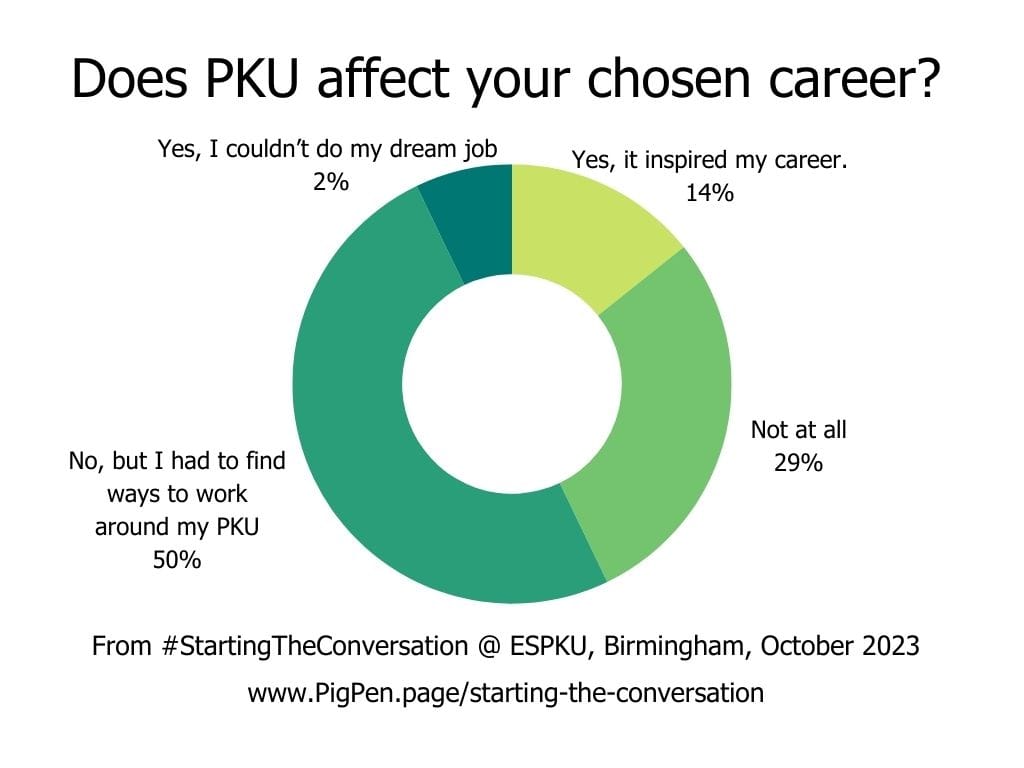Starting the Conversation

In October 2023, I chaired a workshop at the ESPKU conference in Birmingham. This workshop would not have happened without the support of the NSPKU and ESPKU teams, and the critical support from other adults with PKU.
This workshop began with the aim of strengthening the voice of adult PKU in our national societies.
PKU adults in patient organisations
The workshop involved a year of planning by several adults with PKU, who began discussing the idea during the 2022 NSPKU conference. We wanted a space where adults with PKU felt able to hold an open discussion about managing PKU as adults, and to collect data about adult concerns in real time.
Many national societies were founded as family organisations, with a critical emphasis on maternal PKU & children. As PKU patients aged, we felt the events catered to us less. This workshop began with the aim of strengthening the voice of adult PKU in our national societies.
Creating a safe space for conversation
At the start of the workshop, attendees were asked to turn off their phones and to not share, record, or take photos in the room. This was to ensure a safe place for people to discuss issues without fear of judgement. The workshop used MentiMeter, interactive presentation software, to display questions regarding ageing, the struggles of staying on diet as an adult, careers & PKU, socialising with PKU, and ensuring representation within the national societies.
A panel of four adults with PKU from across Europe led discussions on each point. The attendees were encouraged to participate in the discussion and post responses on MentiMeter to aid our data collection. These responses were shown anonymously in real time, which often aided the discussions.
We found three immediate and three long-term areas for national organisations to work on.
How to support PKU adults
The room was packed with little standing room available. Two sessions were planned, but all participants eagerly arrived for the first session. This was a blessing, as it allowed us to overrun and take the time needed for the discussions. A need for both more space and more time will be a top priority at the next workshop!
We found three immediate and three long-term areas for national organisations to work on. In the short term, more advice and support with socialising, travelling and in the workplace & career planning. While making plans to support people in the long term with mental health, aging difficulties and providing more social events. This may mean working with clinics to ensure these concerns are addressed.
Key requests from PKU adults
- better mental health support (from mild symptoms like anxiety and stress to deeper mental health issues)
- better travel/supplement support
- more in-depth understanding of the effect of phe levels on our careers
- better socialising support
- more questioning about concerns with PKU and ageing, particularly and the effects on our brain & body as we age
- improved social networks, provide opportunities for PKU folks to meet, both online and in person
Selected results
(Those which can be reported succinctly. The participant's age range was 22-51.)
Does PKU affect your chosen career?

It was heartening to see that PKU inspired some participants in their career, however, over half of participants found that PKU impacted their career negatively.
Does PKU impact your social life?

All responses indicated that PKU takes a toll on their social life. Given the nature of the treatment and the importance which food plays in social occasions, this is not unexpected. More thought needs to be given to supporting adults in managing PKU as their social lives expand beyond home and school.
I am not aware of prior data regarding this question before, so this result is significant.
Are you concerned about aging with PKU?

The majority of participants were concerned about aging with PKU. I am not aware of prior data regarding this question before, so this result is significant. Given that one of the conference presentations earlier in the day noted that nothing is known about ageing with PKU, this fear is critical yet unsurprising.
How could your national organisation support you more?

An open-ended question, with 36 responses, which can be roughly grouped as follows:
- 41% More adult focussed events, including online opportunities to mingle as adults
- 28% More mental health support
- 25% Adult focussed help dealing with clinics, and accessing new treatments
- 6% Mentorship programme for younger adults with PKU
The desire for more support from peers was continued in this question, with many wanting their national organisations to facilitate meetings and support networks.
Can you help with PKU research?
I hope to run, or help others to run, similar workshops at future PKU events & conferences. Please do get in touch if you are interested in running a workshop

